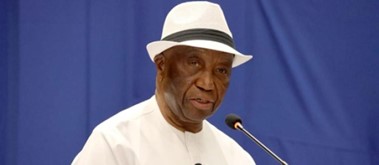A Tumultuous First Year: President Boakai’s Leadership and Liberia’s Unresolved Challenges
Joseph N. Boakai’s inauguration as Liberia’s 26th president in January 2024 ushered in a new era of hope and expectation. His inaugural address resonated with promises of unity, development, and a resolute commitment to tackling corruption, revitalizing the economy, and advancing social justice. However, the optimism surrounding his ascension was quickly met with the harsh realities of a nation grappling with the legacy of economic mismanagement and deeply entrenched corruption inherited from the previous administration. The weight of these challenges, coupled with emerging controversies surrounding President Boakai’s own governance, marked a turbulent first year in office.
Boakai inherited a shattered economy, crippled by rampant corruption and depleted foreign reserves. The Liberian dollar plummeted, inflation soared, and food insecurity reached alarming levels, pushing a significant portion of the population into extreme poverty. These economic woes were further compounded by a lack of access to essential services, trapping many in a cycle of deprivation. While the extent of the economic damage was inherited, the Boakai administration’s response during the first year lacked a cohesive strategy and a clear vision, leaving the nation adrift and exacerbating the existing crisis.
The administration’s lack of preparedness was evident in the delayed and often opaque appointment process for key government positions. Controversy plagued numerous appointments, with accusations of cronyism and the selection of individuals with questionable backgrounds. Several appointees were linked to corruption scandals, raising serious doubts about the administration’s commitment to transparency and accountability. This pattern of controversial appointments further eroded public trust and fueled concerns about the government’s ability to effectively address the nation’s challenges. The perceived prioritization of political connections over meritocracy cast a shadow over hopes for genuine reform.
The Boakai administration’s economic policies during the first year raised serious concerns about fiscal responsibility. Despite campaign promises to curb borrowing, the national debt ballooned. A proposed budget heavily weighted towards recurrent expenditures further exacerbated anxieties about the government’s long-term economic strategy. The failure to deliver on a key campaign promise to improve road infrastructure added to the growing public discontent, demonstrating a disconnect between rhetoric and action. The deteriorating security situation, marked by a significant rise in violent crime, further underscored the administration’s struggles to provide basic services and maintain order.
The healthcare system, already fragile, continued to deteriorate under Boakai’s leadership. Hospitals faced dire conditions, lacking essential supplies and struggling with crippling electricity costs. The exodus of healthcare professionals further exacerbated the crisis, leaving vulnerable populations without adequate access to care. The neglect of the healthcare system exemplified a broader pattern of governmental indifference to the needs of its citizens, particularly the poor. This neglect further fueled public disillusionment and raised questions about the administration’s priorities.
Adding to the administration’s woes were allegations of corruption and impunity within its own ranks. Accusations of bribery, unauthorized disbursements of funds, and breaches of procurement protocols cast a dark shadow over the government’s commitment to ethical conduct. The President’s own alleged involvement in financial improprieties, including the unauthorized purchase of luxury vehicles and alleged bribery of legislators, further damaged public trust. The administration’s perceived reluctance to investigate these allegations and the lack of consequences for those implicated fostered a culture of impunity, undermining efforts to promote accountability.
President Boakai’s first year was also marked by a disregard for constitutional mandates and an apparent willingness to circumvent established legal procedures. The Supreme Court’s ruling against his appointments to tenured positions, followed by his defiance of the ruling, highlighted a concerning pattern of executive overreach. The controversial suspension of key officials, including the Chairperson of the National Elections Commission, raised further questions about the administration’s commitment to democratic principles and the rule of law. These actions fueled anxieties about the potential erosion of democratic institutions and the consolidation of power within the executive branch.
Furthermore, the President’s tendency to appoint individuals primarily from his own region exacerbated existing societal divisions and fueled perceptions of favoritism. This approach undermined efforts to promote national unity and inclusivity, further isolating segments of the population and deepening existing societal fractures. While the signing of an executive order to establish a war crimes court represented a positive step towards addressing past injustices, the controversy surrounding the appointment of individuals with ties to previous conflicts to key diplomatic positions underscored the complexities of reconciliation and the challenges of building a cohesive national identity.
The first year of President Boakai’s administration has been a stark reminder of the deep-seated challenges facing Liberia. The initial optimism surrounding his inauguration has been replaced by growing concerns about his leadership, his commitment to reform, and his ability to effectively address the nation’s complex problems. While it is important to acknowledge that one year is a limited timeframe for evaluating a six-year term, the patterns established during this initial period raise serious questions about the direction of the country. Moving forward, President Boakai must demonstrate a genuine commitment to the rule of law, transparency, and inclusive governance if he hopes to regain public trust and steer Liberia towards a more prosperous and equitable future. The need for transformative change is urgent, and the Liberian people deserve a government that prioritizes their needs and aspirations above political expediency and self-interest.


